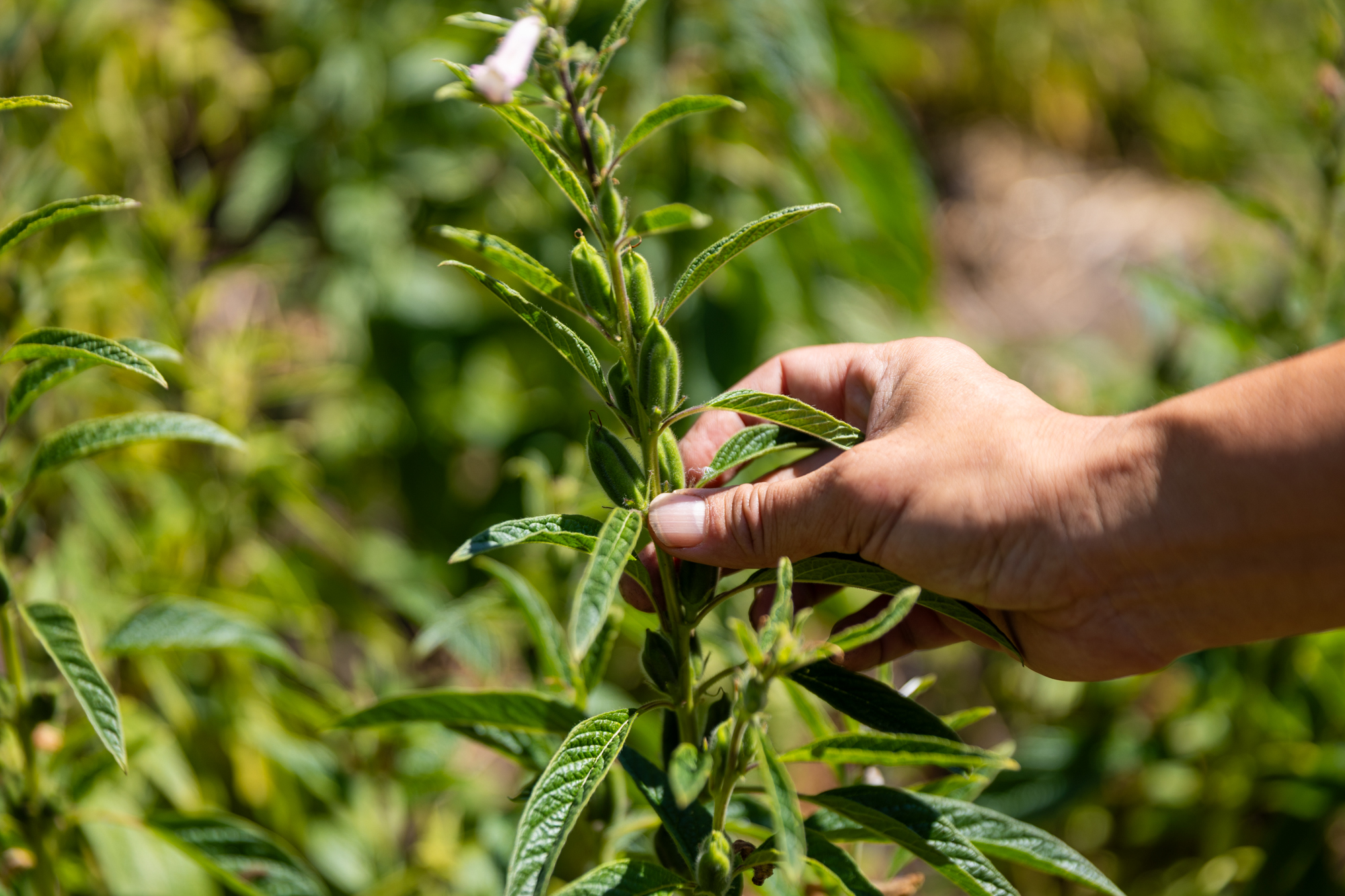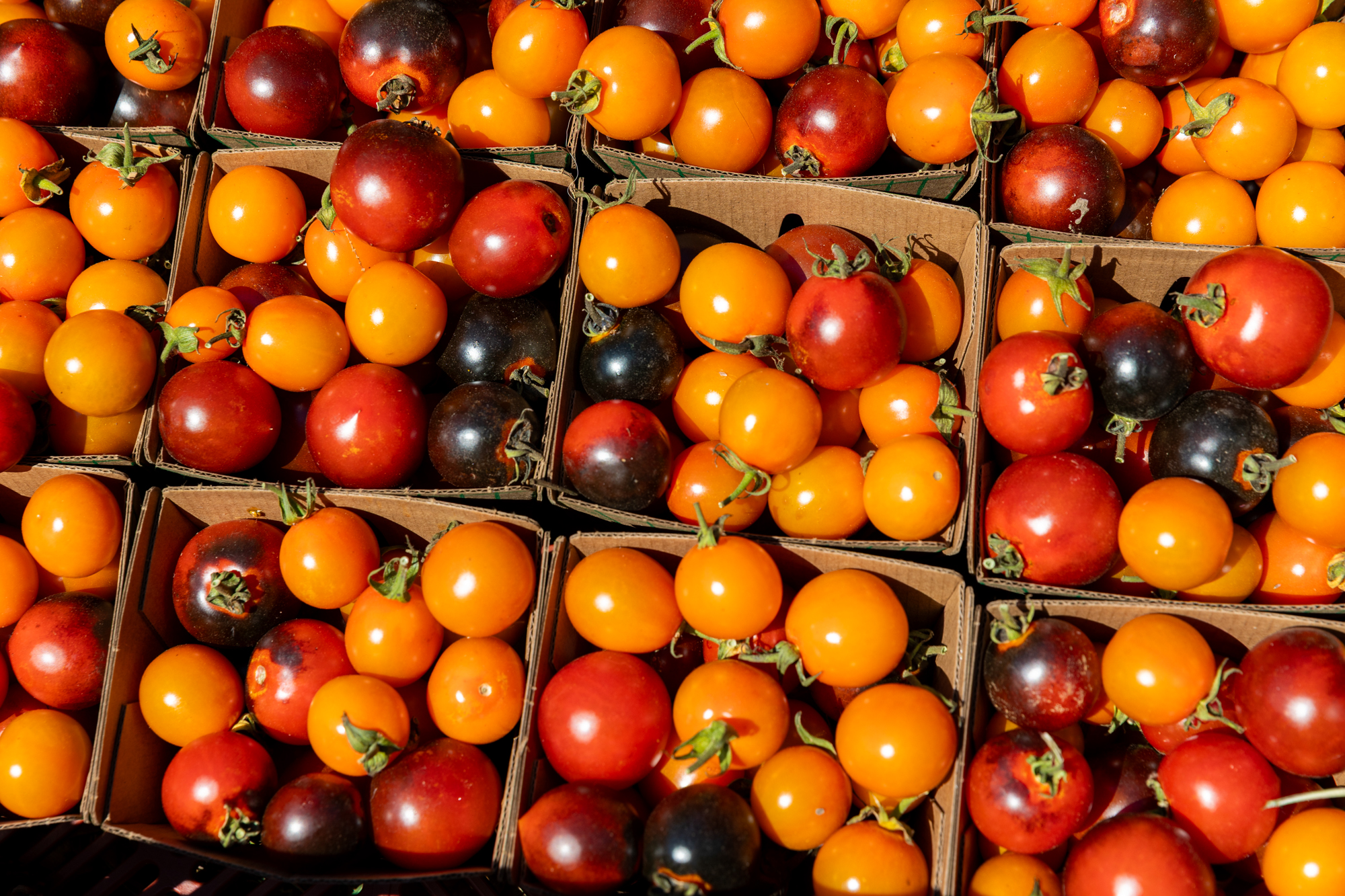“We basically grow Asian vegetables to understand and explore our cultural identities and ancestries, but through our queer experiences of being in diaspora,” said Kellee Matsushita-Tseng, a fourth-generation Japanese American and third-generation Chinese American farmer.
In 2019, she co-founded the Bitter Cotyledons with her partner, Tam Welch, a Korean American who works in the arts. As Matsushita-Tseng explained, the name of the collective carries ideas about the nourishing qualities of bitter Asian foods and queer communities — and how both can grow despite being underappreciated. (A cotyledon is the first leaf that emerges from a plant embryo, providing it with nutrients while it grows.)
 Kellee Matsushita-Tseng, founder of Bitter Cotyledons, poses for a portrait at Trescony Community Gardens in Santa Cruz on Aug. 30, 2025. Bitter Cotyledons strives to build a community for queer and Asian individuals to connect with their culture through gardening and food. (Tâm Vũ/KQED)
Kellee Matsushita-Tseng, founder of Bitter Cotyledons, poses for a portrait at Trescony Community Gardens in Santa Cruz on Aug. 30, 2025. Bitter Cotyledons strives to build a community for queer and Asian individuals to connect with their culture through gardening and food. (Tâm Vũ/KQED)
Every weekend, the Bitter Cotyledons meet to tend their plot at the community garden, a city-owned space. With twelve regularly active members, the collective is growing around 35 different vegetables and herbs, including Chinese licorice, Japanese Akahana Mame beans, Vietnamese coriander and perilla. It’s a lot for their 750 square feet of land (300 of which is on loan from a neighboring gardener). If given more space, they’d keep expanding.
And they aren’t alone. According to the USDA, an increasing number of Asian Americans are getting into agriculture. Between 2017 and 2022, the number of Asian farmers and ranchers in the U.S. rose by 8 percent, even as the total number of farmers and ranchers fell by about 1 percent. California leads the way with the highest number of Asian farmers, including Matsumoto Family Farm near Fresno, and Leslie Wiser at Radical Family Farms and Kristyn Leach at Gohyang Fields, both in Sebastopol. In some ways, the Bitter Cotyledons reflect this broader trend. But they aren’t growing crops for mass distribution or profit — they’re cultivating queer and cultural belonging.
“A lot of us have difficult or distant relationships with our blood families in part because of our queer identities,” Matsushita-Tseng explained. Coming together around plants is a way to connect with their cultures on their own terms and in alignment with their own values.
Chrysanthemum dreams
Outside the garden, the collective gets together periodically to cook, share meals and exchange recipes. Hot pot loaded with the different vegetables they’ve grown is a particular favorite.
In the past, the group has selected which plants to cultivate together, but this year, each member is responsible for one plant on their own, nurturing it from seed to the kitchen. “The one I’m focusing on this season is the chrysanthemum,” said Louise Leong, a Chinese American artist. She’s already tossed the edible greens from one variety of the flower into soup and rolled them into a batter with shrimp to make fritters.
 Members of Bitter Cotyledons tend to their gardening plot at Trescony Community Gardens in Santa Cruz on Aug. 30, 2025. (Tâm Vũ/KQED)
Members of Bitter Cotyledons tend to their gardening plot at Trescony Community Gardens in Santa Cruz on Aug. 30, 2025. (Tâm Vũ/KQED)
Leong joined the Bitter Cotyledons after responding to a call for new members on Lex, an app for finding LGBTQ+ friends. “It said something like, ‘Queer Asians who want to learn how to grow vegetables — join here,’” Leong said, chuckling. “At that time, I was getting more interested in my heritage and learning how to cook more Chinese dishes.” Bitter Cotyledons gave her a safe space to express the “shame” she felt for not already knowing how, she said.
Even if Leong had had that knowledge, sourcing the ingredients on her own wouldn’t have been easy. Santa Cruz’s lack of an Asian grocery store is a reason Leong and other collective members often hear for why Asian Americans wind up leaving the city.
Santa Cruz County has only a 6 percent Asian American population — a stark contrast to 43 percent “over the hill” in Santa Clara County, where Asian grocers and restaurants are far more abundant. Before they started growing their own produce, collective members routinely had to drive 30 miles to San Jose to shop at places like 99 Ranch, Mitsuwa Marketplace, Đại-Thành Supermarket or H-Mart if they wanted to cook anything with “special vegetables,” Matsushita-Tseng said.
That includes choy sum, gobo (Japanese burdock root), gai lan (Chinese broccoli) and mustard greens. Now, the collective’s garden allows members to cultivate hard-to-find varieties that aren’t available in grocery stores at all.
A need for community
At the Santa Cruz plot, the four gardeners who’d come to tend to their plots this day observed with concern that their mugwort had spread wildly, threatening to overrun the surrounding plants. Without hesitation, Nat L., one of the oldest members, took action, snipping off the tall stalks with garden shears while the others looked on, amused by their quick response.
“It was just three of us for a while,” said Nat, a biologist born and raised in Singapore who declined to give their last name. Nat met Matsushita-Tseng and Welch at a plant swap and joined Bitter Cotyledons during a time of intense isolation and introspection in the spring of 2021.
 A black sesame plant grows on Bitter Cotyledons’ plot at Trescony Community Gardens in Santa Cruz on Aug. 30, 2025. (Tâm Vũ/KQED)
A black sesame plant grows on Bitter Cotyledons’ plot at Trescony Community Gardens in Santa Cruz on Aug. 30, 2025. (Tâm Vũ/KQED)
California was slowly reopening after an almost yearlong lockdown. Anti-Asian rhetoric and hate crimes had surged after Donald Trump’s claims that China was to blame for COVID-19. A gunman had shot and killed eight people, six of Asian descent, at Young’s Asian Massage Parlor in Georgia.
“I was trying to figure out my place here, in a very white community, when all these massive discussions and questions around race and racial justice were happening,” Nat said. “There was a real need to be able to talk about it and have community, sometimes to just express frustrations at the system.”
Before she started the collective, Matsushita-Tseng came from a similar place. As a farmer, she often found herself in environments where she was the only queer person and person of color. Bitter Cotyledons was born out of “necessity,” she explained. “For queer folks, at least in my experience, our survival and well-being depend on the ability to be in community.”
Now involved in multiple land-based collectives, she also works with Second Generation Seeds, a group of farmers preserving Asian heirloom seeds — some of which have found their way into the Bitter Cotyledons plot.
As morning gave way to afternoon, other community gardeners slowly began arriving to work their soil and water their plants. Gophers tunneled underground, gnawing on roots and occasionally popping their heads up to sniff the air. One surfaced near Leong, who sat low to the ground in a small, repurposed classroom chair, reflecting on the benefits of collective gardening.
 Harvested tomatoes fill containers at Trescony Community Gardens in Santa Cruz on Aug. 30, 2025. (Tâm Vũ/KQED)
Harvested tomatoes fill containers at Trescony Community Gardens in Santa Cruz on Aug. 30, 2025. (Tâm Vũ/KQED)
Like others in the group, she said gardening with other queer Asian Americans has supported her mental health, something she thinks about deeply as a therapist’s wife. “Our families have all experienced trauma from migration or war, separation or interpersonal relationships,” Leong said. “But then there’s also this aspect where you don’t really talk about it. I think that’s fairly common in Asian families and Asian communities.”
In fact, research indicates that community gardening and access to culturally significant foods are both powerful tools for promoting mental well-being. Gardening with others in a group enhances resilience and reduces depression. And expressing one’s cultural identity through food has been associated with pleasure, belonging and comfort.
In the Bay Area, these wellness resources are particularly important, as financial barriers and a lack of gender- and culturally-affirming providers pose major obstacles to mental healthcare for queer and trans Asian Americans and Pacific Islanders, according to Jasmine Hoo, the healing justice organizer at Lavender Phoenix, a Bay Area organization dedicated to meeting the needs of this population. While not a panacea, collective growing can provide gentle support, with benefits that sometimes extend beyond the garden.
For Bitter Cotyledons co-founder Welch, those benefits include being able to keep a roof over their head. For the last three years, the National Low Income Housing Coalition has ranked Santa Cruz County the most costly place to rent, not only in California but in the nation. So when Welch’s landlord sold their apartment building, giving them two months to find a new place after 15 years of tenancy, the Bitter Cotyledons were the ones who stepped in, helping with the move and offering food.
 Tam Welch, co-founder of Bitter Cotyledons, poses for a portrait at Trescony Community Gardens in Santa Cruz on Aug. 30, 2025. (Tâm Vũ/KQED)
Tam Welch, co-founder of Bitter Cotyledons, poses for a portrait at Trescony Community Gardens in Santa Cruz on Aug. 30, 2025. (Tâm Vũ/KQED)
“Without this group, I would not have stayed in Santa Cruz,” Welch said.
Before co-founding the gardening collective, Welch said it had been challenging to build a queer Asian community, as potential friends often moved away for more affordable housing. Now, Welch no longer worries about finding community because they know they’ll find it at their shared garden plot every weekend.
Bitter Cotyledons has gotten large enough now that most people hear about it through word of mouth. Recognizing the diversity of the Asian diaspora, the group is expanding to include Pacific Islanders, Southwest Asians and North Africans (SWANA).
“There’s a lot of interest in learning about culinary Asian ancestral foodways,” Welch said, noting that even straight people have inquired about joining the collective. However, Welch and Matsushita-Tseng are committed to preserving this uniquely queer space, ensuring their community has a place to feel rooted.


Comments are closed.